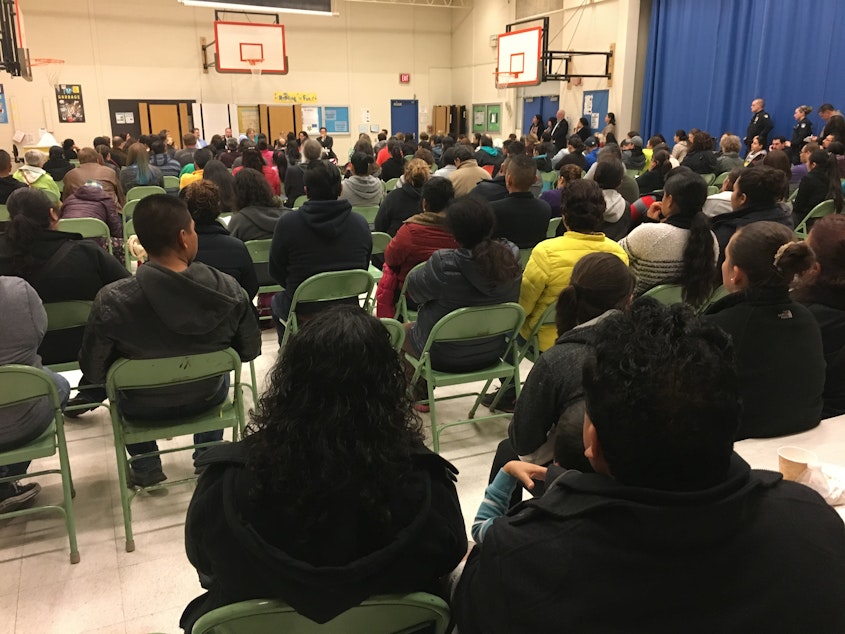7 chilling tips for immigrants who fear deportation under Trump

Hundreds of immigrants packed a school gym on Thursday night. But not for something normal, like a basketball game.
They were Latino and undocumented, there to talk about how to ready themselves for a shift in immigration policies under a new White House. President-elect Donald Trump has said he plans to ramp up deportations and roll back some protections for people who are here without legal status.
A young father listened to a panel of immigration attorneys give advice as he held a young daughter in his arms, replacing her pink slippers as they repeatedly fell to the floor.
Another girl played with Disney princess dolls as her mom scribbled notes and phone numbers. A group of teenage girls sat together in the front row.
The advice they heard was real. And practical. And chilling.
Sponsored
1.
“Update your emergency contacts,” urged one school administrator. “If you can’t pick up your kid from school, we need to know who to call.”
2.
A lawyer suggested that a contact person should be someone with legal status in the U.S., since they’ll have more rights and options. She also called for public pressure on schools and universities to keep these places safe and accessible for undocumented students.
“Let’s make sure they don’t lose scholarships and tuition help,” she said.
Sponsored
3.
“Have a game plan for the worst-case scenario,” suggested another attorney, referring to families being separated if a parent is detained or deported.
4.
Give power of attorney to a friend or relative who has legal status in U.S., so they can look after your children if needed, or your personal property. A city official on the panel noted how his Japanese relatives took similar measures when they were sent to internment camps during World War II.
5.
Sponsored
A representative from the Consulate of Mexico advised people to gather any paperwork they may need in another country – passports, birth certificates, school transcripts. It can be extremely difficult to obtain some of these documents once outside the U.S.
6.
Avoid brushes with the law, warned another lawyer.
“Drive the speed limit. Use a designated driver if you’ve had a beer.”
And maybe lay off pot if you use it, he said. Marijuana use is legal in Washington state but still a federal crime, he warned. Trump has said he plans to ramp up deportations of unauthorized immigrants with criminal records.
Sponsored
7.
Watch out for scammers. Several attorneys stressed that they often see fraudulent offers for legal services or help with paperwork anytime there's a shift in immigration policy. One common scam is when people pose as attorneys and call themselves 'notarios publicos,' which can denote a legal professional in some Hispanic countries but not in the U.S.
The City of Bellevue and community groups organized the event quickly, following a flood of questions from immigrants after Trump’s election.
Many said they were afraid to come to the meeting. Yet the need for answers and options seemed to outweigh their fears. No recordings or photos of people's faces were allowed. Bellevue Police Chief Steve Mylett reassured the crowd that officers to not make an issue of immigration status, unless someone is suspected of a serious crime.
People in the audience asked about the timeline for Trump’s immigration plan – what could happen soon and what could take longer?
Sponsored
Lawyers on the panel said President Barack Obama’s executive order on Deferred Action for Childhood Arrivals, DACA, could be quickly scrapped. The DACA program provides deportation protection and work permits to young immigrants who were brought to the U.S. as children. Attorneys said other changes that require Congressional action will take more time.
Free legal clinics that work with immigrants in the Seattle area are overwhelmed and groups are looking for ways to add more services in the coming weeks. The Eastside Legal Assistance Program, which helped organize Thursday’s meeting, said it plans to set up extra clinics in the coming weeks.
Amid the practical advice and worries, there were some moments of optimism when the crowd rallied together.
“Is it over? Is our life here over?” one woman asked in Spanish, choking back tears.
“Nothing is over,” said attorney Karol Brown. “We are going to fight, fight, fight.”
In Washington, an estimated 250,000 people are unauthorized immigrants. They make up 5 percent of the state’s workforce. And roughly 1 out of every 12 students in K-12 schools has a parent who is undocumented.

